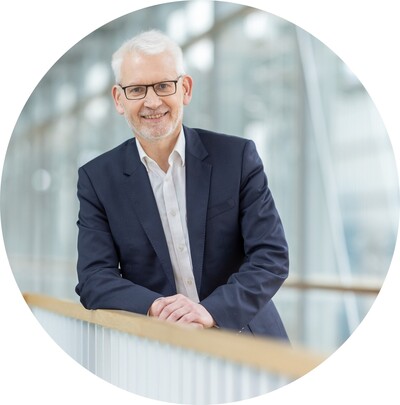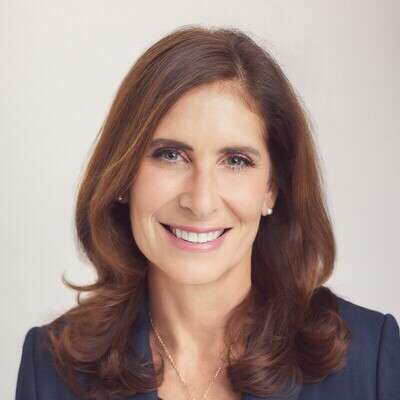Boyden Executive Survey
Executive View with Michael D. Lewis, CEO and Chief Sustainability Officer, Uniper SE
“In the energy industry we are being driven to innovate to create an entirely new energy system, involving every element upstream and downstream”

Today’s complex landscape demands adaptive, empathetic leaders, who accelerate decision-making to navigate opportunity and mitigate risk. In an exclusive series, Boyden's data-driven 2023 research on Exploring adaptivity through strategy and talent is complemented by in-depth interviews from trailblazers across the globe, sharing their perspectives on core issues across organisational strategy, leadership and talent.
This interview features Michael D. Lewis, CEO and Chief Sustainability Officer of Uniper SE and Non-Executive Director, United Utilities Group plc. At the time of interview, Michael was CEO of E.ON UK plc. Uniper SE was spun out of E.ON, the parent company of E.ON UK.
Discussion Highlights:
- Net zero is restructuring the energy industry, driving innovation and changing the players in upstream and downstream.
- Multiple crises, digital changes and AI advances are happening simultaneously; black swan events have become business as usual.
- Constant change is both negative and positive; stress and burnout versus innovation and achieving ‘the impossible’. Leaders need to find the right balance between change and stability.
- The relationship between supervisory and management boards is much closer. The supervisory board is more involved in framing the organisation, with a greater operational focus. A diverse supervisory board can therefore have more impact.
- Decision-making needs to be faster to reflect the market, with decisions delegated right to the point of action.
- From multiple crises, we learned the value of people talking directly round the table. The principle of bringing senior people together for operational meetings has stayed.
- Looking to the future, we need a portfolio of options available to react quickly to government policy and new opportunities. Changes in the sector are too big for one company to do everything; pick an area of focus and deliver it really well.
Boyden: With sustainability concerns, rapid AI developments and geopolitical risk, does adaptive leadership resonate with you?
Michael: Yes, and not just in terms of energy, although the environment is changing so rapidly the sector is more subject to it than others. The overarching force of climate change – net zero – is completely restructuring the industry away from fossil fuels to nuclear and flexible generation. This is impacting every area; expansion, new technologies, new ways of engaging customers, and different roles for different parts of the value chain.
The overlay of the pandemic was a massive challenge. In some ways, it was positive with hybrid working, in some ways negative in not being able to bring teams together. Then the energy crisis sparked by Russia’s invasion of Ukraine resulted in massive price increases. In my thirty-year career I have never seen anything close to it1. We had to change everything we thought was normal, our perception had to change, and quickly.
“All these changes are happening simultaneously and what would previously have been a black swan event has become business as usual”
We also have the digital space and AI which is changing at a terrifying pace. All these changes are happening simultaneously and what would previously have been a black swan event has become business as usual.
The last three to four years have been relentless. What’s the impact on leaders? It’s been very challenging and we have had to ask extraordinary things of ourselves and the people in our organisations. On the plus side, we had to do things differently. Before the pandemic, running our entire organisation with everyone working at home would have seemed impossible, yet we did it in a matter of days.
• • •
Boyden: What is the impact of such massive change?
Michael: Constant change leads to stress and potential burnout, but being asked to do things differently also leads to innovation and achieving things you thought were impossible. For leaders, it’s about managing that dynamic. Bertrand Russell2 described this by saying you need a certain amount of stability to provide a platform for long term plans, but you need to inject a little chaos and disruption so it doesn’t ossify.
That balance is what it is all about. We have been through an exceptionally turbulent period and learnt a lot about agility and the ability to adapt quickly to new trends and external challenges.
• • •
Boyden: Is today’s disruptive environment shifting the relationship between the board and the leadership team?
“The supervisory board is more visible and more involved in framing today’s organisation... Adaptability is the watch word and a diverse supervisory board can be a real help.”
Michael: This is true, the board is more hands on, and there is a much closer relationship. My sense is that there is a closer relationship between the supervisory and management boards. The supervisory board is more visible in today’s organisation, and more involved in framing the organisation, that’s a good thing. Adaptability is the watch word and a diverse supervisory board can be a real help.
• • •
Boyden: How is today’s environment affecting decision-making? Are you relying more on particular people or roles?
Michael: First, it needs to be much quicker due to the external environment moving so fast. You have to delegate more, right down to decisions made closest to the action. It’s important that you really delegate in practice and in theory. And you are delegating responsibility but not accountability, so that requires trust.
“You need to start reflecting the wider patterns of society. What diversity can bring to [decision-making] is different ways of thinking and framing a problem, so diversity of people in decision-making roles is important”
It also means you need the right teams involved, bringing the right experiences to the table, depending on whether it’s a customer issue or another issue; you need to start reflecting the wider patterns of society. What diversity can bring to this is different ways of thinking and framing a problem, so diversity of people in decision-making roles is important. External expertise is also helpful to include different perspectives.
• • •
Boyden: To what extent are you leading in two timeframes – present and future – and how is this impacting you and your leadership team?
Michael: Ideally, if you are in the most senior executive team in the company, you think mostly about the future, allocating resources for intellectual property, HR, future challenges and so on. But because of multiple crises – Covid, Ukraine, energy prices – senior teams have had a tendency to be more focused on the present rather than the future.
Looking back to Covid, we had emergency calls with the whole board every morning for months because we were making big decisions every day. This was true also in the energy crisis, every morning for a period. In fact, both crises involved extensive discussions with the government on a regular basis, meeting with the Secretary of State almost weekly. In my career as a senior executive, I have never been so close to daily operational decision-making, out of sheer necessity.
It was useful to have a bit of a rhythm, and the principle of bringing senior people together for operational meetings has stayed. Now things have settled, it does also mean that we can get back to thinking about strategic challenges, which is where senior executives ought to spend more of their time.
• • •
Boyden: How are your conversations changing around growth?
Michael: In the energy industry we are being driven to innovate to create an entirely new energy system, involving every element up-stream and downstream.
At the same time, power generation has to expand massively for electric vehicles and heating. The new system will treble, while at the same time decarbonising; green power plants will have to grow as well as flexible green generation, and networks and customers will have to use heat pumps, solar-powered energy and smart metres. It’s an entire refurbishing of the energy system. There is so much growth, the question is which area to focus on.
“We are all looking at the same problem through a different lens... trying to figure out our role in the future market”
There are different and interesting collaborations ahead; we have a current collaboration with BMW on EV chargers. Car manufacturers and oil majors are having their markets disrupted, new entrants have come along like Tesla, and battery manufacturers with new opportunities. Traditional utilities who provide electricity are seeing this as growth opportunity. We are all looking at the same problem through a different lens. Some see this as a threat or an opportunity, and we are all trying to figure out our role in the future market. Will we provide charging stations because that’s our infrastructure model? Do we cooperate with oil majors? We are all simultaneously dancing around the handbags about who does what.
• • •
Boyden: How is the current environment affecting your people strategy?
Michael: At E.ON I am involved in looking at how the workforce needs to change to reflect the changing market, shifting from a commodity supplier to a service provider. This might comprise installing a heat pump, EV charger and a tariff that optimises all those devices. That requires a different skill set to traditional commodity retailers – a workforce with high craft skills and strong digital skills to get the consumer journey right. There are all sorts of different configurations happening at same time.
Traditionally we have had quite a strong depth of digital skills in the organisation because we have a huge IT infrastructure at E.ON. It hasn’t been a problem so far, but it will come; I think the challenge will be if new entrants to the market start to do things differently and we have to compete in a different way.
“[Regarding skills] the challenge will be if new entrants to the market start to do things differently and we have to compete in a different way”
We are able to retain the right IT or digital talent and be sufficiently competitive. We also train our own people, bringing a lot of young people in as graduates or on digital apprenticeships, or through our digital university programme. We have leveraged the importance of apprenticeships and they have been a very good source for recruitment.
• • •
Boyden: What is your organisation’s most favourable opportunity through 2024?
Michael: It’s all about innovation, and how you have ‘the innovation conversation’.
When the future is more uncertain than it has ever been, it’s about creating optionality. You have to be ready to move quickly into a space where value is suddenly emerging. That means having options to exercise at the right time. For instance, if government suddenly puts in place a new policy to incentivise heat pumps, you would have to be ready to pivot to push resources into that area. The same for green hydrogen, so you need a portfolio of options available to react quickly to whatever the new opportunity is. From the scenario analysis we have done, broadly speaking we know where the energy market is going, but not which technologies will win or when. So, you have to be ready within a certain framework for different technologies emerging at different points.
• • •
Boyden: Given all of this, will you continue the level of dialogue you had around the Covid and energy crises?
Michael: What we learned is that it’s very helpful, even if you have disagreement, to get around the table and talk directly. The conversation is still around net zero. The energy crisis in many ways is the flip side of net zero, reducing dependency on imported gas and therefore the potential for supply disruption. So, supply and net zero are congruent.
This is too big for any one company to do everything. In recent years, we have seen big integrated utilities focusing on downstream customers and grids, while RWE3 focused on upstream, building the business in offshore wind. It's a question of picking an area of focus and delivering it really well, but being ready to innovate in that space and have sufficient options to pivot and change tack when the time is right.
Read Full Report
Boyden Global Executive Survey 2023: Exploring adaptivity through strategy and talent
- - -
Executive Biography
Michael D. Lewis is CEO, Chief Sustainability Officer and Labour Director, Uniper SE, based in Germany. He is also Non-Executive Director, United Utilities Group plc. He has 30 years’ experience in the energy sector with a special focus on renewable energy. He started his career in 1993 at Powergen in the UK, and since 2007 has held various positions at E.ON, including CEO for Climate & Renewables and since 2017, CEO of E.ON UK. In this position, he gave this interview.
Michael is a chartered surveyor and chartered water and environmental manager. He gained an MA in environmental law at De Montfort University and studied strategy implementation and change at Harvard Business School.
This interview was enabled by Josh Blackman, Partner, Boyden United Kingdom.




